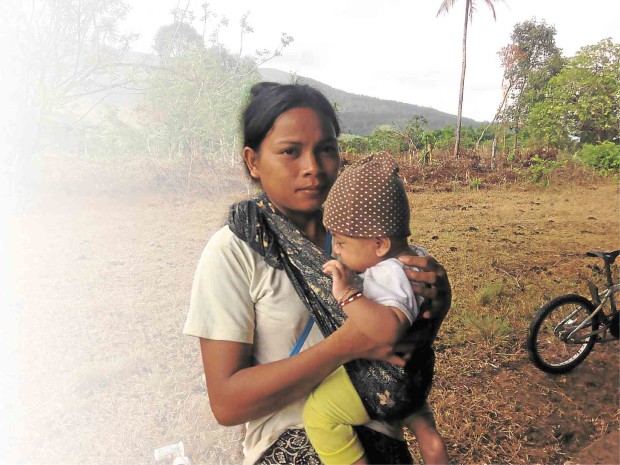Palawan tribe bears brunt of drought

MEMBERS of the Palaw’an tribe in Bataraza town in Palawan struggle as severe drought dries up their mountain farms and water sources. REDEMPTO D. ANDA/INQUIRER SOUTHERN LUZON
BATARAZA, Palawan—The unusual and severe dry season that has swept the country for over seven months is taking a deadly toll on a community of Palaw’an indigenous tribes living in Bataraza town’s most remote interiors hardly reached by basic government services.
In the village of Sumbiling at the foothills of the Bolanjao mountain range, the tribal communities are running out of food traditionally coming from the forest, as most of their water sources have dried up and traditional farming has become unsustainable because of the absence of rainfall.
A barren landscape of dried up grass, a dry Sumbiling River and parched lands has replaced a once lush lowland forest, now strewn with pockets of “kaingin” (slash and burn) farms vainly waiting for rain.
“We need the rains to irrigate our farms. It has not rained in a long time. There is not even mist in the evenings to dampen the soil,” said Kennedy Correo, a Palaw’an tribal leader.
The Philippine Atmospheric, Geophysical and Astronomical Services Administration (Pagasa) forecasts the end of the long El Niño cycle by the start of June and warned that the reverse climatic pattern La Niña would bring heavy rains soon.
On Wednesday, the Palawan government declared a state of calamity in the entire province due to the drought. The provincial agriculture office estimated crop losses to have reached P400 million.
Previously, local governments in three towns—Dumaran, Roxas and Taytay—and the City of Puerto Princesa issued separate state of calamity declarations to allow the local governments to use their calamity funds for drought-hit communities.
Resilience
“We have missed the planting season. It’s going to be hard for our families because we have nothing to harvest,” Correo said.
Integral to their culture, the Palaw’an, for centuries, have lived off the land using mainly a traditional form of slash and burn farming. They would clear patches of forests for one planting season but would ensure its regrowth after harvest.
Around the Bolanjao mountain range adjascent to the protected area of Mt. Mantalingahan live around 200 Palaw’an families distributed in 11 villages of Bataraza.
The unpredictability of weather patterns has challenged the Palaw’an’s traditional way of life. Their leaders have admitted that the pressure on them to produce food for their sustenance under difficult circumstances have led to environmental problems.
“We have experienced forest fires in Bolanjao started off by our kaingin. That is why we have started to avoid doing it in the upper areas. We would rather stop kaingin but we have little option to provide for our livelihood,” Correo said.
Mining royalty
A mining company, the Rio Tuba Nickel Mining Corp. (RTNMC), that has been operating for over two decades in Rio Tuba, Bataraza, has been paying the mandatory annual royalty fees that are shared by the affected villages, with all of 11 villages around Mt. Bolanjao having been designated as “impact areas.”
The royalty, which this year amounts to over P3 million, goes to projects like scholarship programs for about 100 high school and several college students, assistance through farm inputs, a milling facility and similar projects identified in the mining company’s social development and management program.
In Sumbiling, however, many community members have become weary of the projects.
“Yes, we have the royalty, but this is not what we need for our daily existence. What we need is our land that will provide for our needs in the long term,” said Isabel Curio, a community leader.
Expansion
RTNMC is seeking to expand its operations into the Bolanjao range, right into the ancestral land claims of the Palaw’an tribes. It is being met with resistance by the tribes that have organized themselves into an association, the Samahan ng mga Magsasaka at Katutubo (Samaka).
“As long as we protect the mountains, we are assured of survival and we will be able to send our children to school,” said Liminda Bartolome, a non-tribal leader and former presidenr of Samaka.
The Palawan Council for Sustainable Development (PCSD), a regulatory body that serves as clearing house for environmentally sensitive projects in Palawan, has endorsed the expansion of RTNMC into Mt. Bolanjao, setting off protests from the tribes and from local officials.
RTNMC officials, during the PCSD deliberations on the firm’s expansion, claimed that Bolanjao is part of their Mineral Production Sharing Agreement (MPSA) area.
“We haven’t felt any help from the provincial government. They have proposed a water project for our community but nothing happened. Most residents here do not want mining,” said Francisco Tablazon, a village councilor of Sumbiling.
Curio credited outgoing President Aquino for having influenced the non issuance of a permit to expand RTNMC operations during his term.
Bartolome said the President issued an executive order freezing all new applications for mining projects in Palawan due to the critical status of the province’s environment.
Kennedy Correo, a Palaw’an elder from Sumbiling, said their community wanted their mountain preserved.
“What matters most is that our mountain remains intact. Regardless of who will assume the presidency, we will fight for our mountain because our livelihood and survival depend on it,” Correo said.














